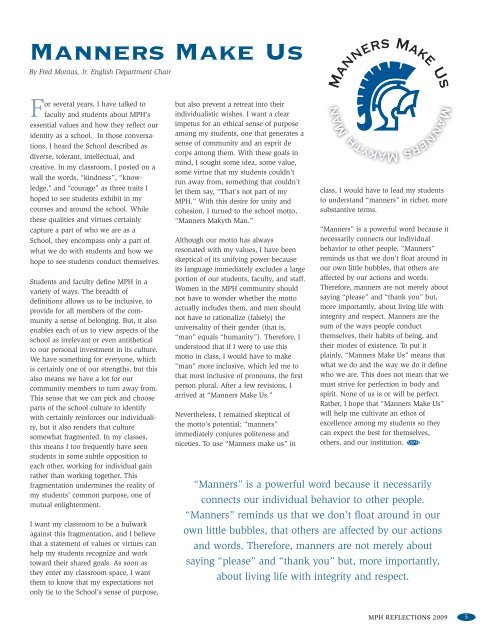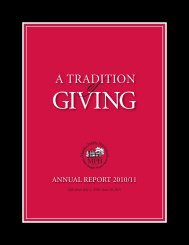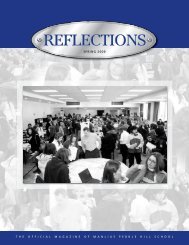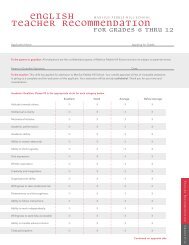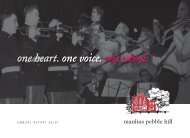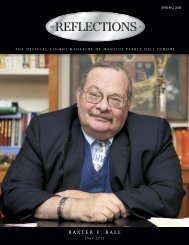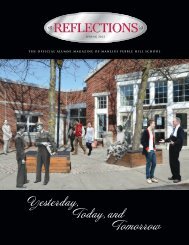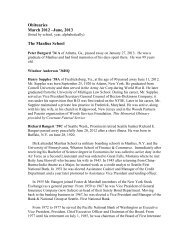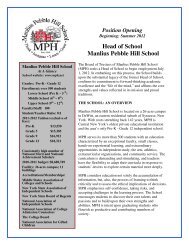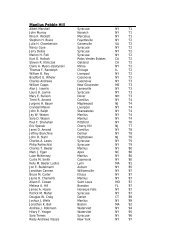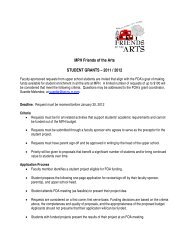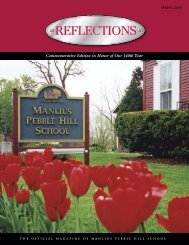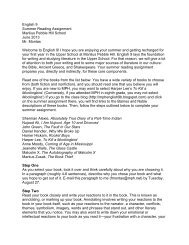MPH Fall Text FINAL:Layout 1 - Manlius Pebble Hill School
MPH Fall Text FINAL:Layout 1 - Manlius Pebble Hill School
MPH Fall Text FINAL:Layout 1 - Manlius Pebble Hill School
- No tags were found...
You also want an ePaper? Increase the reach of your titles
YUMPU automatically turns print PDFs into web optimized ePapers that Google loves.
Manners Make UsBy Fred Montas, Jr. English Department ChairFor several years, I have talked tofaculty and students about <strong>MPH</strong>’sessential values and how they reflect ouridentity as a school. In those conversa -tions, I heard the <strong>School</strong> described asdiverse, tolerant, intellectual, andcreative. In my classroom, I posted on awall the words, “kindness”, “know-ledge,” and “courage” as three traits Ihoped to see students exhibit in mycourses and around the school. Whilethese qualities and virtues certainlycapture a part of who we are as a<strong>School</strong>, they encompass only a part ofwhat we do with students and how wehope to see students conduct themselves.Students and faculty define <strong>MPH</strong> in avariety of ways. The breadth ofdefinitions allows us to be inclusive, toprovide for all members of the com -munity a sense of belonging. But, it alsoenables each of us to view aspects of theschool as irrelevant or even antitheticalto our personal investment in its culture.We have something for everyone, whichis certainly one of our strengths, but thisalso means we have a lot for ourcommunity members to turn away from.This sense that we can pick and chooseparts of the school culture to identifywith certainly reinforces our individuali -ty, but it also renders that culturesomewhat fragmented. In my classes,this means I too frequently have seenstudents in some subtle opposition toeach other, working for individual gainrather than working together. Thisfragmentation undermines the reality ofmy students’ common purpose, one ofmutual enlightenment.I want my classroom to be a bulwarkagainst this fragmentation, and I believethat a statement of values or virtues canhelp my students recognize and worktoward their shared goals. As soon asthey enter my classroom space, I wantthem to know that my expectations notonly tie to the <strong>School</strong>’s sense of purpose,but also prevent a retreat into theirindividualistic wishes. I want a clearimpetus for an ethical sense of purposeamong my students, one that generates asense of community and an esprit decorps among them. With these goals inmind, I sought some idea, some value,some virtue that my students couldn’trun away from, something that couldn’tlet them say, “That’s not part of my<strong>MPH</strong>.” With this desire for unity andcohesion, I turned to the school motto,“Manners Makyth Man.”Although our motto has alwaysresonated with my values, I have beenskeptical of its unifying power becauseits language immediately excludes a largeportion of our students, faculty, and staff.Women in the <strong>MPH</strong> community shouldnot have to wonder whether the mottoactually includes them, and men shouldnot have to rationalize (falsely) theuniversality of their gender (that is,“man” equals “humanity”). Therefore, Iunderstood that if I were to use thismotto in class, I would have to make“man” more inclusive, which led me tothat most inclusive of pronouns, the firstperson plural. After a few revisions, Iarrived at “Manners Make Us.”Nevertheless, I remained skeptical ofthe motto’s potential: “manners”immediately conjures politeness andniceties. To use “Manners make us” inanners Makyth Manclass, I would have to lead my studentsto understand “manners” in richer, moresubstantive terms.“Manners” is a powerful word because itnecessarily connects our individualbehavior to other people. “Manners”reminds us that we don’t float around inour own little bubbles, that others areaffected by our actions and words.Therefore, manners are not merely aboutsaying “please” and “thank you” but,more importantly, about living life withintegrity and respect. Manners are thesum of the ways people conductthemselves, their habits of being, andtheir modes of existence. To put itplainly, “Manners Make Us” means thatwhat we do and the way we do it definewho we are. This does not mean that wemust strive for perfection in body andspirit. None of us is or will be perfect.Rather, I hope that “Manners Make Us”will help me cultivate an ethos ofexcellence among my students so theycan expect the best for themselves,others, and our institution.“Manners” is a powerful word because it necessarilyconnects our individual behavior to other people.“Manners” reminds us that we don’t float around in ourown little bubbles, that others are affected by our actionsand words. Therefore, manners are not merely aboutsaying “please” and “thank you” but, more importantly,about living life with integrity and respect.MManners Make Us<strong>MPH</strong> REFLECTIONS 2009 5


